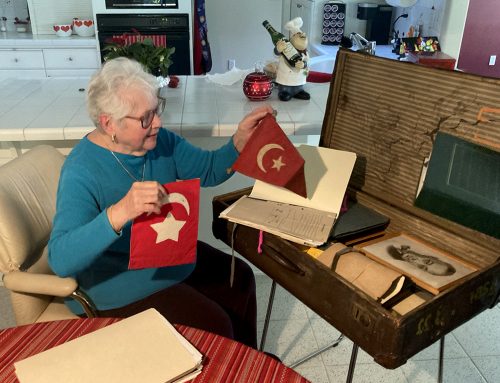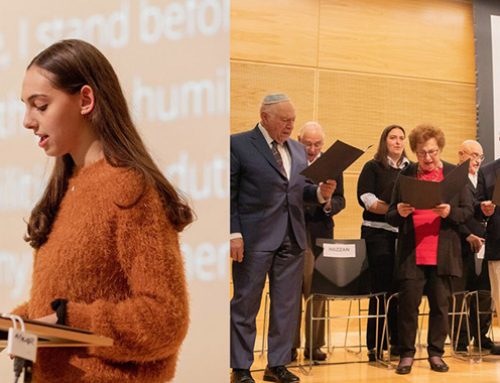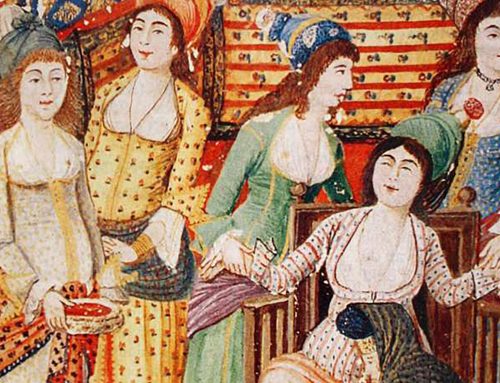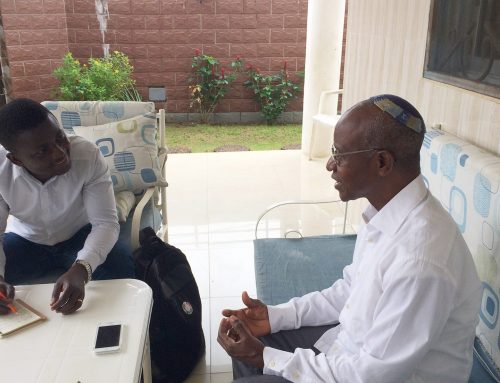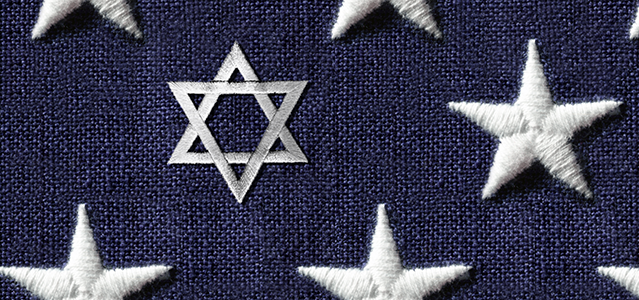
By Jeremy Derfner
In my youth, I developed a habit of dating shiksas—and then I married one last year. I can understand why some people question my commitment to Judaism. However, my intimacy with non-Jews has led me to start wondering whether my pristine brethren (with Jewish spouses) are quite as Jewish as they think.
The more time my wife and I spend in Jewish company, the more she convinces me that many of the characteristics we like to think of as uniquely Jewish—arguing, eating, and managing surplus guilt, to take three examples—are common to many ethnic groups, if not all human beings.
Take the food thing. It’s true that my grandmother enjoyed feeding me: matzah brei on Pesach, the Rooty Tooty Fresh ‘n Fruity from IHOP on special occasions, and Famous Amos cookies more or less all the time. My father occasionally objected to the cookies, to which Grandma responded, “He’s a growing boy!” (which indeed I was).
But when we visit my wife’s Dutch grandmother (we’re occasionally late, because what I call Jewish time her family calls Dutch time), it’s not as if she sends us home empty-stomached. She’s always trying to feed me something called stroopwafels. Moreover, she’s Dutch! They’re better known for their ovens than for the food that comes out of them! If she were Greek or Italian or Japanese, I’m sure I’d be walking around with tzatziki or bruschetta or spicy tuna rolls spilling out of my pockets.
On guilt, it’s well-known that Catholics share our penchant for it. I’m sure it comes in slightly different varieties, depending on who’s experiencing it. As the joke says, Catholics feel guilty before sex, and Jews feel guilty after. Catholicism, an orthodoxic religion, focuses on sinful thoughts, whereas Judaism is orthopraxic and zeroes in on actions. While making such Talmudic distinctions (or are they Jesuitical?) may be intellectually stimulating, the larger point is that guilt is a universal emotion that is as much the province of philosophers and psychologists as anthropologists and sociologists.
Fortunately, we live with the benefit of postmodernism. What matters is our subjective experience, not some objective truth about the innate Jewishness of the cultural markers we’re comfortable with. Does our relationship to food feel Jewish to us? Does our anguish feel Jewish to us? There is no good reason Italians and Jews can’t both claim arguing, eating, and fretting as unique qualities. Our identities don’t have to stand up in a court of law. We just have to feel them deeply.
This suggests to me that Judaism is something anyone (including my Christian wife) can practice by choice—and Jewish is something anyone can be by choice. We are not a race, whatever that means. We are also not the recipients of some primordial inheritance because our grandparents ate their portion of cholent. We are Jewish because we choose Jewishness as the context for our everyday lives. If we practice Jewish ritual and study Jewish history and texts, and if we do those things within a community of Jews, then we will start to see universal activities like eating through a particular lens. Volunteering, which Christians might refer to as their ministry, becomes tikkun olam because of what we read and are taught.
We all accept that people can convert to Judaism, the religion. Through an informal process that rabbis have less authority over, maybe they can also convert to Jewishness, the identity. Gradually, if my wife puts in a lot of effort and continues to learn and observe with those in our community, maybe she can “convert,” even if she doesn’t wish to convert.
For the record, she has a LOT more work to do. When I showed her the “you cut the turkey without me?” scene in Avalon, she didn’t get it. I tried to explain it—after all, it combines arguing, eating, and feeling guilty all in one! But it can’t be explained. It has to be spontaneously understood, or felt.
I believe people can learn to feel like Jews. For the sake of the Jewish community and those non-Jews living alongside it (including my wife), I hope we welcome those who don’t have the proper resume but do have an open heart and a genuine interest in a Jewish way of life.
Jeremy Derfner is a writer at the Bill & Melinda Gates Foundation. A former member of our web site’s Editorial Council, he is currently participating in the Wexner Heritage Program and recently joined the Advisory Board of the Stroum Center for Jewish Studies. Originally from South Carolina, Jeremy has lived in Seattle for 10 years.
Editor’s Note: Check back with jewishstudies.washington.edu/newsite for future posts in dialogue with the lively national conversation about the Pew survey on American Judaism.

